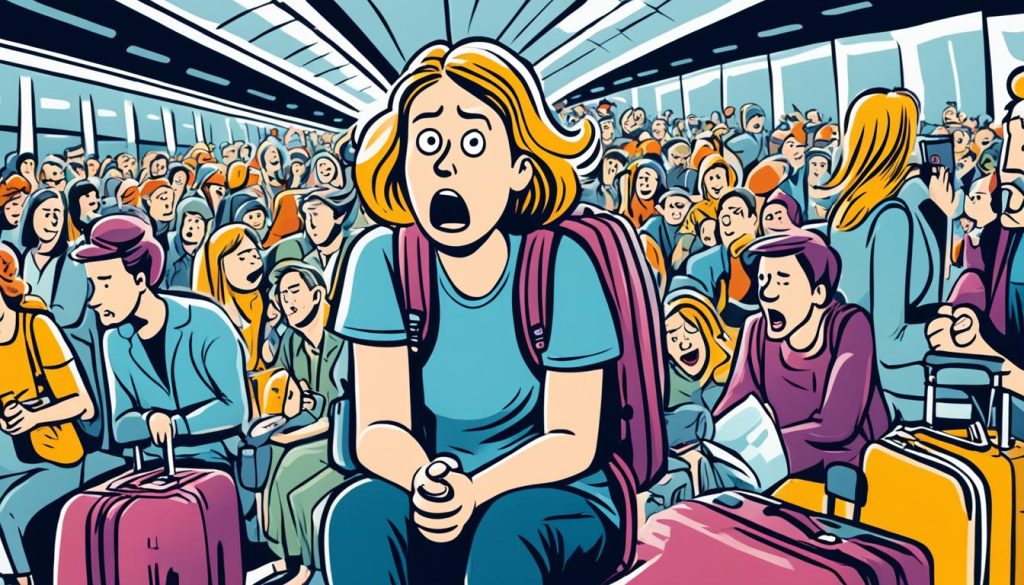Traveling can be exciting and broadening, but it can also make some people anxious. About 40 million people in the U.S. face travel anxiety every year1. This can happen even if you don’t usually worry a lot. Things like new places, changes in your routine, and the unknown can make you stressed and anxious.
Feeling a bit nervous when traveling is normal, but too much anxiety can ruin your trip. It might even stop you from going on trips. Knowing why you feel anxious and finding ways to deal with it can help you enjoy your travels more.
Key Takeaways
- Travel anxiety is a common experience, affecting an estimated 40 million people in the U.S. each year1.
- Anxiety disorders, a fear of flying, and the impact of global events like COVID-19 can all contribute to travel anxiety2.
- Coping strategies like identifying triggers, planning thoroughly, and seeking support can help manage travel anxiety2.
- Traveling outside of your routine can increase feelings of well-being, confidence, and connections to other places and people1.
- Consulting a mental health professional can provide personalized guidance for overcoming travel anxiety.
What is Travel Anxiety?
Travel anxiety is a common condition that makes people feel anxious when they travel3. It can be mild or severe, causing everything from slight unease to full-blown panic attacks3. Often, it comes from fears of the unknown, feeling out of control, or being overly sensitive to new sights and sounds3.
Understanding the Concept
Even though it’s not a formal mental health diagnosis, travel anxiety can really affect people’s lives4. Signs include feeling panicky, shaking, shortness of breath, and a racing heart3. Some people get anxious just thinking about a trip, while others feel it more when they’re actually traveling or in a new place3.
Travel anxiety varies in intensity, from a minor annoyance to a major problem3. Studies show that up to 80% of people feel dread and anxiety when traveling5. Over 90% of those afraid of flying worry they’ll get overwhelmed during the flight4.
But, travel anxiety doesn’t have to control your life. With the right strategies and support, you can manage it and enjoy traveling again534.
Is Travel Anxiety Real?
Yes, travel anxiety is a real condition. It affects about 40 million people in the U.S. each year6. Many of these folks struggle with anxiety when traveling. The exact number of people with travel anxiety is hard to say, but it’s a big issue for many.
Travel anxiety is a serious mental health issue. It should be treated with the same care as other anxieties6. Many things can cause it, like bad past experiences, phobias, feeling uncertain, or always expecting the worst6. Cognitive Behavior Therapy (CBT) is a top choice for treating travel anxiety6.
Some people might not realize they tend to worry too much, which makes their anxiety worse6. But, there are ways to deal with travel anxiety. Techniques like meditation, deep breathing, and using mantras can help6. Also, eating well and getting enough sleep are key. Avoiding things that make you anxious can make it worse, but facing them can help you feel better over time6.
Travel anxiety is a real issue that needs support. By knowing what causes it and using the right strategies, people can enjoy their travels more6.
Common Causes of Travel Anxiety
Travel anxiety is a common issue that can make enjoying trips hard7. In the U.S., anxiety disorders affect 40 million adults, or 18.1 percent, yearly7. Yet, only about 40 percent of those with anxiety get treatment7.
Exploring the Triggers
Many things can trigger travel anxiety, like fear of the unknown, bad past trips, and flying itself78. The pandemic has made anxiety worse, with fears of flying, crowds, crashes, social situations, disease, the unknown, and being out of comfort zones8.
Anxiety affects both mind and body; staying hydrated and well-fed helps fight it while traveling7. Stressors like weather, delays, traffic, and lost luggage can also trigger anxiety9.
Genetics and brain changes can also play a part in anxiety, making some more prone to it7. Knowing what triggers your anxiety can help you tackle it.
Understanding travel anxiety’s causes and triggers helps people manage it better and enjoy their trips more98.
Coping Strategies for Travel Anxiety
As summer travel starts, many people face travel anxiety10. But, there are ways to handle this and make travel fun.
Deep breathing exercises are a great technique10. Long, slow breaths can really help lower anxiety10. Learning to breathe deeply, like with box breathing, can calm your mind and body before and during trips11.
Mindfulness and meditation are also key for easing travel anxiety10. These practices have been shown to lessen stress and boost health10. Focusing on now, not the future, can make you feel more in control.
Talking to others can also help. Joining online groups or finding local support can give you a sense of community and advice10. Having someone experienced to travel with can also ease your worries10.
Getting ready for your trip can also ease your mind. Skip the alcohol, which can make anxiety worse10, and exercise before flying to relax10. If your anxiety is serious, seeing a mental health expert is a good idea10.
Using these strategies can help you handle your anxiety and enjoy your travels. Remember, the right tools and mindset can beat travel anxiety, letting you fully enjoy the adventures ahead.101112

The Benefits of Traveling Despite Anxiety
Traveling with anxiety can be tough, but it also has many benefits. The Hostelworld Global Traveler Report shows that Americans are less likely to travel than Europeans13. On average, people from the UK, Germany, and France visit around 5 to 10 countries each13. About 71 percent of Americans say they don’t travel abroad because it’s too expensive13. Yet, overcoming travel anxiety can lead to big rewards.
14 Travel can help reduce stress and ease anxiety and depression14. Almost 80% of people find that travel lowers stress and improves their mood14. It lets you explore new cultures and learn new things, which is good for your mental health14. Travel acts as a way to escape and build confidence in yourself.
13 Women who vacation twice a year are less likely to have heart attacks than those who don’t travel much13. Men who skip vacations have a higher risk of dying and getting heart disease14. Regular travel is good for your mental health and helps you grow personally.
14 Travel broadens your thinking and makes you more creative14. It boosts brain function and mental health by making you more productive and focused14. Travelers tend to think more diversely and solve problems better.
14 Experiences from travel make people happier than material possessions13. A study found that travelers feel less anxious and more rested after a trip, and these feelings last for weeks13. Traveling internationally can make you more creative by improving your thinking and adapting to new cultures.
13 Looking forward to a trip makes you happier than buying something new13. Women who vacation often are less likely to feel depressed and stressed out.
Travel anxiety is real, but the benefits of traveling despite it are clear. By managing your anxiety and using coping strategies, you can still enjoy the many positive aspects of travel. It offers personal growth and new experiences.
Conclusion
Travel anxiety is a common issue that can make traveling hard to enjoy. By understanding what causes it and how to deal with it, you can enjoy travel more15.
Research shows that traveling can make you feel better. It can lower stress and depression and improve your health1516. Even planning trips can make you happier and more content15.
Travel anxiety might seem scary, but the benefits of exploring new places are huge. By using the tips and resources here, you can face your fears and enjoy your trips more. Remember, the journey is just as important as the destination. With the right mindset and tools, you can make every trip special, even with travel anxiety1617.
FAQ
What is travel anxiety?
Travel anxiety is when you feel scared, worried, and stressed in new places. It can cause panic attacks, physical symptoms, and trouble staying in the moment.
https://balamga.com/what-makes-the-perfect-travel-blogs-for-adventure-seekers/
Is travel anxiety a real condition?
Yes, it’s a real condition. About 40 million people in the U.S. deal with anxiety each year. Many of them feel anxious when traveling.
What are the common causes of travel anxiety?
Fear of flying, feeling out of place, bad past travel experiences, worries during a trip, and genetic or brain factors are common causes.
How can I cope with travel anxiety?
To manage travel anxiety, know what triggers it, plan your trip well, use relaxation techniques, bring comfort items and distractions, take care of yourself, and get support from others.
Can traveling benefit those with anxiety?
Yes, traveling can make you feel better, more confident, and connected to new places and people. Facing and beating travel anxiety can also make you stronger and more resilient.

